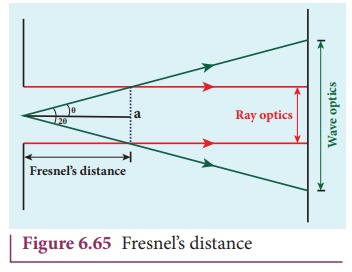Diffraction - FresnelŌĆÖs distance | 12th Physics : UNIT 7 : Wave Optics
Chapter: 12th Physics : UNIT 7 : Wave Optics
FresnelŌĆÖs distance
FresnelŌĆÖs distance
FresnelŌĆÖs distance is the distance up to which the ray optics is valid in terms of rectilinear propagation of light. As there is bending of light in diffraction, the rectilinear propagation of light is violated. But, this bending is not significant till the diffracted ray crosses the central maximum at a distance z as shown in Figure 6.65. Hence, FresnelŌĆÖs distance is the distance upto which ray optics is obeyed and beyond which ray optics is not obeyed but, wave optics becomes significant.

From the diffraction equation for first minimum, sin╬Ė = ╬╗/a; ╬Ė = ╬╗/a
From the definition of FresnelŌĆÖs distance, sin2╬Ė = a/z; 2╬Ė = a/z
Equating the above two equation gives, ╬╗/a=a/2z
After rearranging, we get FresnelŌĆÖs distance z as,

EXAMPLE 6.33
Calculate the distance for which ray optics is good approximation for an aperture of 5 mm and wavelength 500 nm.
Solution
a = 5 mm = 5 ├Ś 10-3 m;
╬╗ = 500nm = 500├Ś10ŌłÆ9 m; z = ?
Equation for FresnelŌĆÖs distance, z = a2/2╬╗
Substituting,
z = [5 ├Ś 10-3]2 / 2├Ś500├Ś10ŌłÆ9
z = 25 m
Related Topics